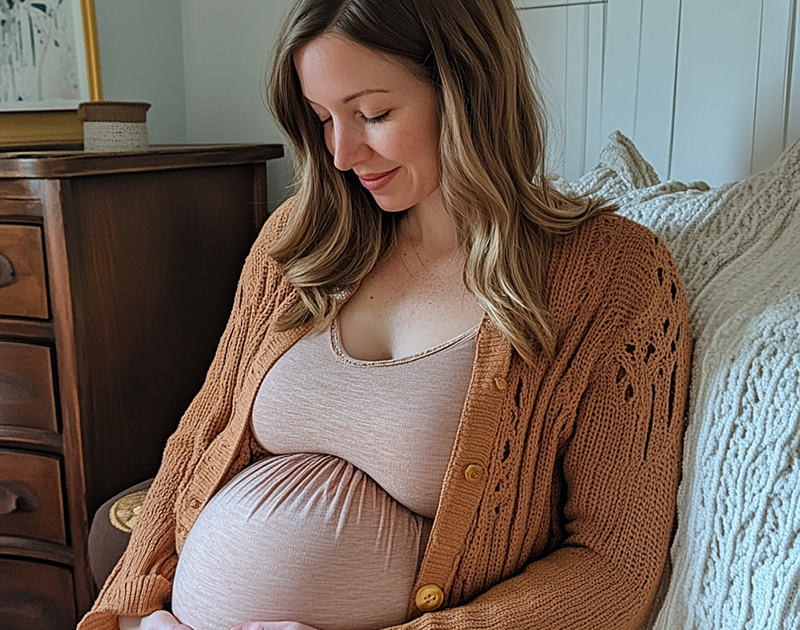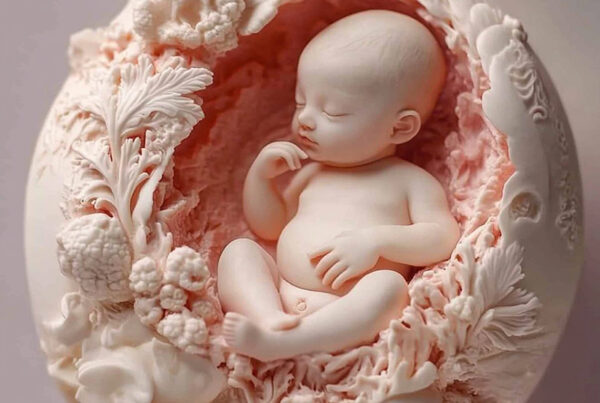Finding out you’re pregnant is an exciting moment, but it can also bring a mix of emotions and questions about what to expect.
One of the first things many women experience after a positive pregnancy test are a range of early pregnancy symptoms. These symptoms can vary from woman to woman, but understanding what they mean can help you navigate this special (and sometimes confusing) time.
Let’s take a closer look at some common early pregnancy symptoms and what they may indicate.
10 Early Pregnancy Symptoms: What to Expect and What They Mean
1. Missed Period
For many women, the most obvious early sign of pregnancy is a missed period. If your cycle is regular, missing your period is often the first clue that you might be pregnant.
However, it’s important to remember that some women can experience light spotting or bleeding even after conception, so it’s always best to confirm with a pregnancy test.
2. Morning Sickness
Morning sickness, which includes nausea and vomiting, typically begins around the sixth week of pregnancy and can last until the end of the first trimester.
Despite its name, morning sickness can occur at any time of day or night. While the exact cause isn’t fully understood, it’s believed to be related to the rise in pregnancy hormones, such as human chorionic gonadotropin (hCG) and estrogen.
What it means: Morning sickness is your body’s way of adjusting to the pregnancy hormones. Although it’s uncomfortable, it’s often a sign that your pregnancy is progressing and your body is preparing to support your growing baby.
3. Fatigue
Many women find themselves feeling incredibly tired in the early stages of pregnancy. You might feel like you need more naps than usual or that you’re drained of energy. This is completely normal and usually peaks during the first trimester. Your body is working hard to support the development of the baby, which is why you may need extra rest.
What it means: Fatigue is a sign that your body is adapting to the pregnancy and increasing blood volume. It’s also a result of the body’s higher progesterone levels, which can make you feel more sluggish.
Read Also: How to Deal with Early Pregnancy Fatigue
4. Tender or Swollen Breasts
One of the earliest signs of pregnancy is changes in your breasts. You might notice that they feel more sensitive, swollen, or tender. Your nipples may also become darker and more prominent. These changes are caused by hormonal shifts as your body prepares for breastfeeding.
What it means: This symptom is your body’s way of preparing for the changes that come with pregnancy and nursing. The sensitivity and soreness usually subside as your body adjusts to the new hormone levels.
5. Frequent Urination
In the early weeks of pregnancy, many women experience an increased need to urinate. You may feel the urge to go more frequently, especially at night.
What it means: The increase in urination is due to hormonal changes that increase blood flow to your kidneys and bladder. It’s also a sign that your body is adjusting to the pregnancy and preparing to support the growing baby.
6. Food Cravings or Aversions
It’s common for pregnant women to experience shifts in their taste preferences. You may crave foods you wouldn’t typically eat, or you might find yourself completely turned off by foods you used to love. These cravings and aversions are likely influenced by hormonal changes during pregnancy.
What it means: Your changing food preferences are part of your body’s adjustment to pregnancy. While cravings can sometimes be a bit strange, they are generally harmless.
However, it’s always a good idea to focus on maintaining a balanced diet to ensure both you and your baby are getting the nutrients you need.
7. Mood Swings
Many women experience mood swings in the early stages of pregnancy. You might feel tearful, overly emotional, or more irritable than usual. These mood changes are linked to the hormonal fluctuations happening in your body.
What it means: Mood swings are a normal part of pregnancy due to the intense hormonal shifts. They are often temporary, and as your body adjusts, your mood may stabilize.
8. Light Spotting or Cramping
Some women experience light spotting or cramping in the early stages of pregnancy. This can occur when the fertilized egg implants in the uterus, known as implantation bleeding. It’s usually light and lasts only a few hours to a few days.
What it means: Implantation bleeding is completely normal and doesn’t indicate a problem with the pregnancy. However, if you experience heavy bleeding or severe cramping, it’s important to contact your healthcare provider to rule out any complications.
9. Headaches
Hormonal changes during early pregnancy can cause frequent headaches or migraines. These headaches can be mild or more intense, depending on the person. Staying hydrated, eating regularly, and getting enough rest can help alleviate some of this discomfort.
What it means: Headaches are often a result of hormonal shifts and changes in your blood circulation. If they become severe or are accompanied by other symptoms, it’s a good idea to check in with your healthcare provider.
10. Increased Vaginal Discharge
You might notice an increase in vaginal discharge, which is typically clear or milky white. This discharge is known as leukorrhea and is a result of increased blood flow to the vaginal area.
What it means: Leukorrhea is common during pregnancy and is caused by hormonal changes. It’s usually harmless, but if the discharge has a foul smell or is accompanied by itching or discomfort, contact your healthcare provider.
When to Contact Your Doctor
While most early pregnancy symptoms are completely normal, it’s important to be aware of any unusual signs. If you experience heavy bleeding, severe cramping, or any other concerning symptoms, don’t hesitate to reach out to your doctor or midwife. Early detection and care can help ensure the health of both you and your baby.
Final Thoughts
Early pregnancy symptoms can be an emotional rollercoaster, but they’re all part of the process of growing a new life. Whether you’re experiencing morning sickness, fatigue, or food cravings, remember that your body is doing amazing things. It’s also important to take care of yourself during this time—rest when you need to, eat well, and lean on your support system.
Every pregnancy is different, so embrace the changes, trust your instincts, and remember that you’re not alone on this journey. You’ve got this! 💛
At BabySteps, we’re here to support you through every twist and turn. Connect with certified experts who can answer your questions, provide advice, and guide you with personalized support on everything from symptoms to nutrition. You don’t have to navigate this journey alone—let us be part of your support team! 🌟




